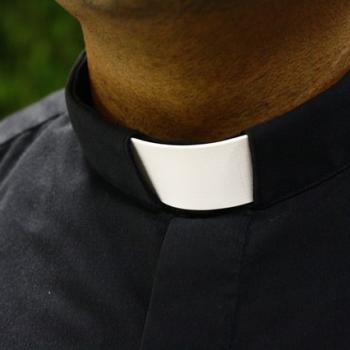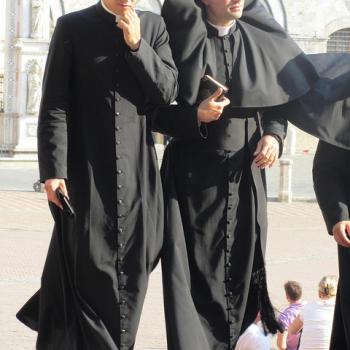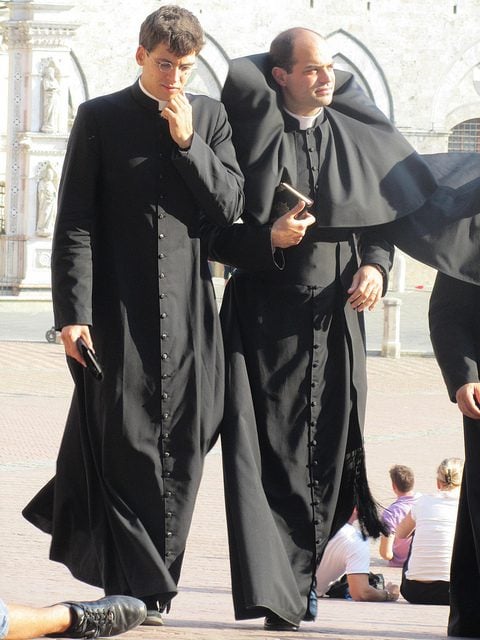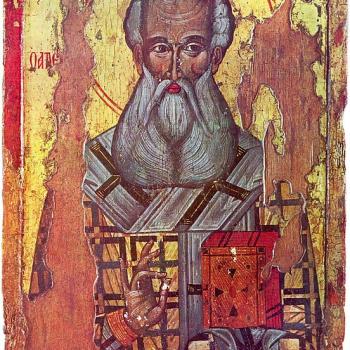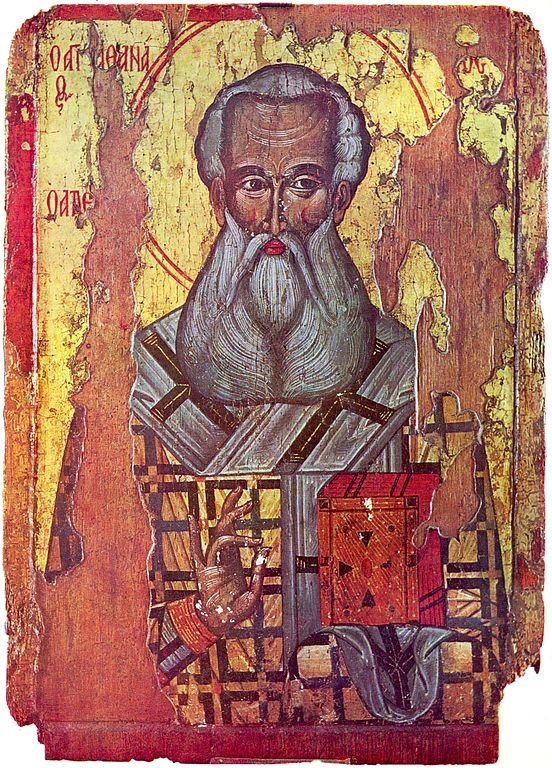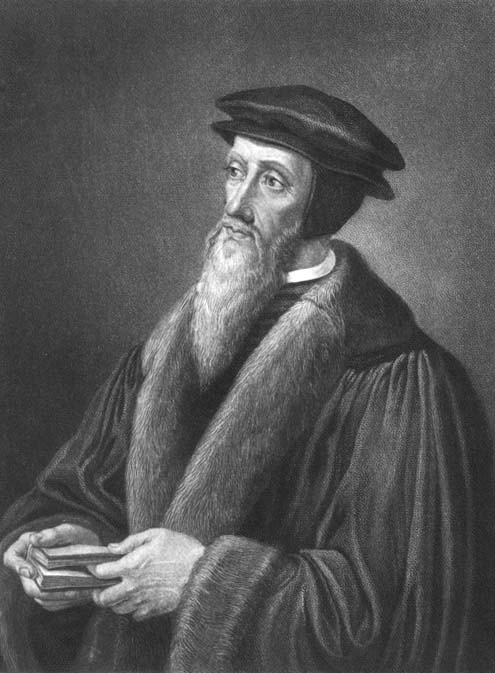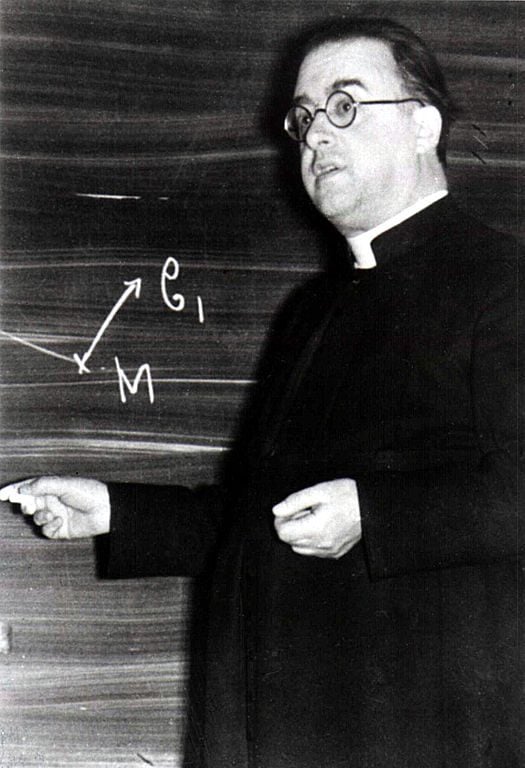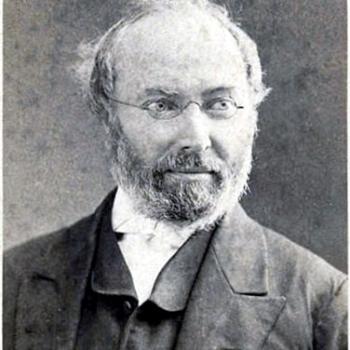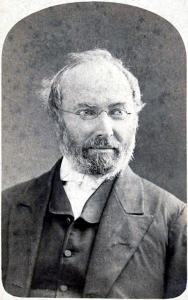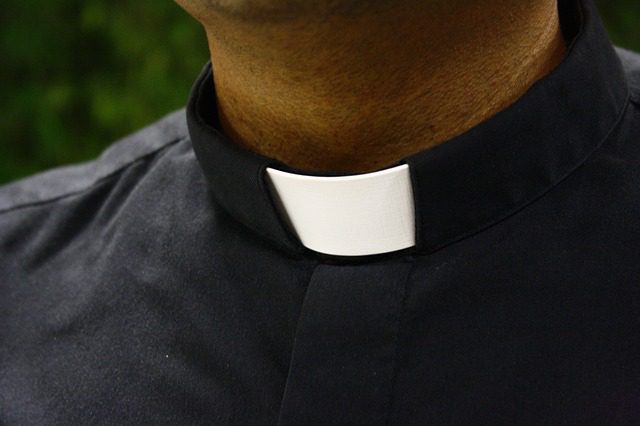
Now, if an institution simply states that “we want our priests to be drawn almost exclusively from that class of men who are called by God to be single, so that they can give undistracted devotion to the Lord [1 Cor 7:35],” then your objection is irrelevant, as the Church is not forcing anyone to do anything, but simply holding that its priests are required to be from this class of those already called in such a manner by God.
In doing this, the RCC is presuming that only celibate people (except for .001%) are called to be priests.
I don’t believe that the Eastern Catholic portion of Catholicism makes up a mere .001% of the whole. Moreover, since we accept the legitimate ordination of Orthodox priests, we clearly acknowledge that there is such a thing as a married priest (and that celibacy is not absolutely fundamental to the definition of priest). But the prevailing tradition in Catholicism is that, ideally, priests ought to be celibate, for the sake of a more undistracted devotion to the Lord and their flocks.
Either that, or they’re intentionally preventing some who have been called by God to the priesthood from fulfilling their calling.
Not at all. Like I’ve always said: such a person is free to become a priest in the eastern Rites of Catholicism, or to become Orthodox.
The first option isn’t Biblical as Ken [Temple] has pointed out and you seemed to agree;
We’re not preventing anyone from doing anything. It’s as if you are arguing that the military “prevents” 80-year-old women from serving in military combat, or that Major League baseball “discriminates” against myopic individuals who wish to become umpires. The fallacy here lies in your thinking, because you can’t prove that our position on this is contrary to any biblical teaching.
and the second option goes against a God-given calling. Neither of these options seems desirable.
When you fallaciously present the options in these terms, of course it is “undesirable.” But the fallacy lies in your false premises.
Every institution has a right to determine its internal rules of discipline and requirements for admission to its offices. This is self-evident.
God has given us all kinds of freedoms, but that doesn’t mean we should exercise every one of them.
That’s correct. Sex is a wonderful freedom within the moral bounds of marriage, and there is nothing wrong with it there, but some men can willingly choose to sacrifice that freedom for the love of God, to be married to Him (Matthew 19:12).
God has given us the freedom to sin, but to embrace that freedom is unwise and hurtful. We have the freedom to make rules contrary to scripture and say the right to do so is “self-evident”, but exercising this freedom is both unwise and hurtful to the RCC.
You haven’t shown to the slightest degree that our rule of celibacy is contrary to Scripture. But we have repeatedly shown that it perfectly squares with Scripture.
As for pastors having rebellious children, my pastor has five and none of them are rebellious (the oldest is 19, the youngest is 7).
This “PK” and “MK” thing will always necessarily be based on anecdotal evidence. But there can be trends observed. One can always produce exceptions to the rule, as with (I am presuming) your pastor. But one thing we can all agree on, I think, is that if a pastor’s job requires him to often be out of his home in hours beyond the usual daytime work hours, this will almost certainly have an adverse effect on his family, because everyone knows that less time with wives and children is not a good thing, if it is ongoing. We need not argue that.
Jethro showed leaders how to balance church life with family life when he saw Moses wearing himself out being judge over everything.
This doesn’t support your case. Moses was doing everything, so Jethro counseled him to divide the labor up a bit. But this usually doesn’t happen with pastors. Sure they have assistants and so forth, but if they are unpaid, they do relatively little and the lion’s share of the work falls back on the pastor. If the assistant pastors or elders are paid, that is only possible if the congregation is quite large, so that funds are available, in which case the labor remains almost what it was, with each one having to deal with so many congregants. It remains, therefore, difficult for the pastor to juggle family responsibilities with pastoral ones.
The same principle applies (analogously) to much of modern-day working conditions. More and more, workers are required to either relocate (which disrupts extended family and friendship ties) or to take frequent business trips (which disrupt nuclear family life and places an undue burden on both spouses). Modern labor and working and business practices run contrary to traditional family solidarity, just as the excessive burdens and responsibilities of a married priest or pastor could and usually does.
Traditionally, families worked together (as on a farm), or the father was at least near the home, working on some trade or craft. After the Industrial Revolution, men started traveling away from home to their jobs, and the trends have continued to be almost consistently hostile to healthy, thriving marriages and family life. I think this has some part in the breakdown of family life we see today (along with many other factors; especially the Sexual Revolution).
Excessive materialism or economic mismanagement (of the larger societies and/or of individual families) have now led, oftentimes, to both parents working away from home, with infants being raised by relatively emotionally unattached daycare workers rather than their own parents, for much of the day. All of these things (including married pastors) mitigate against the ideal, most healthy family life.
He taught Moses to set up a hierarchy, and Paul confirmed that when teaching Timothy. My pastor has excellent elders who have excellent deacons, and this all makes the pastor’s job so much easier.
If indeed they allow the pastor to be less busy after “working hours,” then this is a good solution which could work in some cases. But that still wouldn’t by any means “prove” that celibacy of the clergy is not also a worthwhile or preferable option to solve the same problems of time management and divided allegiance between flock and family.
In other words, I could argue that this is one solution to the problem, and the Catholic celibate clergy is another, and that you have no grounds to say that the Catholic Church must choose either your solution, or to combine both methods, rather than to concentrate on one (with an allowance of or preference towards the other in portions of the Church). If 1 Corinthians 7 and Matthew 19 were not in the Bible, your case would be far stronger, but since they are, you are unable to rule out our approach and discipline, let alone deem it “unbiblical.”
Yes, the stereotype of rebellious pastor’s kids exists for a reason, but I believe the reason is that many pastors try to do too much rather than allow capable elders and deacons to do their jobs.
One of the reasons for that is that Protestantism (and Catholicism also; it’s a general human tendency) tends to place too much burden on the pastor or priest and make him the guy who does all the “spiritual” work while the congregants and laypeople just sit there and benefit from that, rather than go out and participate in evangelism and charity and other necessary and worthy Christian endeavors.
Since pastors and priests are paid to do what they do, the ones who are unpaid tend to think that they don’t have to do anything, or very little of “Christian” work. This is part and parcel of the mentality of western culture that the only worthwhile work is that which is remunerated (hence, the looking down upon of, for example, housewives or home-schooling mothers, because they don’t get paid; one often hears women say, “I’m just a housewife . . .”, as if they should be ashamed of the most important work in the world: raising and discipling children). All this being the case, the “PK” phenomenon will continue to manifest itself, whereas all that is eliminated with a celibate priest or pastor.
I agree with Ken’s final comments. Celibacy is preferable if one is called to remain celibate,
Then you concede virtually all of the argument to us. We want our clergy to come mostly from the group of people who are called by God to be celibate.
but I also believe God calls many who are married to the “priesthood” (He certainly did in the Old Testament).
And he certainly does today: in the Eastern Catholic rites and in Orthodoxy. The question as to what ordination itself means is a different topic that I won’t dive into at this juncture.
That’s as biblical as celibacy, but to choose celibacy as the only way to the priesthood (with almost no exceptions) is unbiblical.
I don’t see how. Neither you nor your friend Ken (or anyone else) has given any biblical verse which precludes a celibate priesthood. All you can do is rail against abuses of the system, as if that proves that the system itself is intrinsically null and void and “unbiblical.” This is standard Protestant polemical practice, but that doesn’t make it valid or legitimate as an argument, either biblically or logically.
Paul didn’t do it,
Paul made no argument forbidding a celibate clergy. On the contrary, he wrote, “I wish that all were as I myself am” (1 Cor 7:7) and “It is well for a man not to touch a woman” (1 Cor 7:1) and “it is well for them to remain single as I do” (1 Cor 7:8) and “Are you free from a wife? Do not seek marriage” (1 Cor 7:27; cf. 1 Cor 7:28-29,32-35,40). The overall thrust of his teaching favors the superiority of singleness as a state to wholeheartedly serve God without having the stress of “worldly troubles” (7:28) or “worldly affairs” (7:33) or “anxieties” (7:32) and “interests” which are “divided” (7:34).
So the Catholic Church (western, Latin rites) adopts this teaching of Paul as the ideal for its priests. Nothing “unbiblical” in that in the slightest . . . Paul also writes many times that we ought to “imitate” him. So how is it “unbiblical” (let alone “forbidden” in some mythical Bible passage) for the Catholic Church to hold that most of its priests should imitate the Apostle Paul and follow his advice for the ideal, highest, most self-sacrificing level of service to the Lord and others?
Jesus didn’t do it,
Jesus said, “there are eunuchs who have made themselves eunuchs for the sake of the kingdom of heaven. He who is able to receive this, let him receive it” (Matthew 19:12). Obviously, many Protestants cannot “receive” this inspired biblical teaching. We Catholics simply decided to select most of our priests from this class that was called by God to celibacy, and who, therefore, willingly renounced (for the sake of the kingdom and undistracted devotion) otherwise good married sexuality.
Peter didn’t do it, John didn’t do it, and none of the other Bible writers (who were writing God’s words) did it. If they didn’t, why would the RCC presume it knows better?
Peter and John taught neither that all priests should be married or that all should be single. Therefore, it is permissible to take a position that priests should be a class of men particularly devoted to the Lord and their flocks, to such a sublime degree that marriage is precluded, because it would divide that devotion, as Paul taught.
The Apostle Paul said, “The Spirit clearly says that in later times some will abandon the faith and follow deceiving spirits and things taught by demons. Such teachings come through hypocritical liars, whose consciences have been seared as with a hot iron. They forbid people to marry and order them to abstain from certain foods, which God created to be received with thanksgiving by those who believe and who know the truth.” (I Tim 4:1-3)
Dave said the RCC simply draws its priests from the pool of people who have the calling of celibacy. That point is definitely contendable; how many priests would have gotten married if it was acceptable?
This is an excellent, indeed quintessential example of the fallacies and lousy reasoning under consideration. I’m delighted that you wrote this. Here is how the above reasoning fails:
1. The RCC simply draws its priests from the pool of people who have the calling of celibacy.
2. How many priests would have gotten married if it was acceptable?
3. Hidden premise of #2: “many priests who became priests with the understanding that celibacy was a requirement and that they were called by God to celibacy were not in fact so called, because they would have gotten married if they could have.”
4. Therefore, there should be no celibate clergy.
The fallacy lies precisely in the gap between #2 (with its underlying premise #3) and #4: #1 cannot be contended against on consistently logical, biblical grounds. So what you do is try to chip away at its legitimacy by using the standard contra-Catholic Protestant polemical technique of railing against abuses and “throwing the baby out with the bathwater”:
1. Catholic priests are supposed to be from the class of people called by God to be celibate (self-understanding and institutional understanding of the ideal, most heroic nature of the priesthood).
2. But some priests entered into the celibate priesthood without this calling to celibacy.
3. Therefore, #1 is null and void.
Of course, #3 doesn’t follow as a “conclusion” at all. #2 does not cast any doubt on #1: not in the slightest. The fact that there exist some persons who abuse the understood system for their own ends, does not invalidate either the system or the biblical and spiritual rationale behind it. All it shows is that there are such unscrupulous or confused persons, or that there has been corruption in the screening process (as indeed there has been in many instances). No one claimed that either people or the Catholic promulgation of its teachings were perfect. But that casts no doubt on the principle itself; thoroughly grounded in the Bible, Tradition, and practical spiritual wisdom of 2000 years of Christianity.
Maybe not all, but definitely some would have. We know this is true, because some have left the priesthood in order to get married.
Sure, but that is irrelevant as a factor in critiquing the system, as just shown. By this “reasoning,” I could just as well argue that Protestantism is disproven because thousands (like myself) have connverted to Catholicism. That proves nothing in and of itself; one has to make the case against Protestantism (or Catholicism, on the flip side) on other grounds besides simply stating that “thousands have found it wanting and have left.”
Dave also said that the RCC doesn’t forbid anyone to get married, but in a sense they really do. If a RC priest wants to get married, he must choose between the priesthood and marriage.
That’s not true. He can become ordained as a married man in the Eastern Rites. At best, you could only say that he must choose between different liturgies. But since they are all fully Catholic, he doesn’t have to choose between the priesthood and marriage.
And if he chooses to remain a priest, he’s forbidden to get married even though he may want to.
If he wants to get married, then he obviously didn’t belong to a class of men who are supposed to be called to celibacy by God (or is in a temporary struggle of accepting his call, etc.). Again, that casts into doubt either his own discernment or the screening process by which he became a (celibate) priest, not priestly celibacy itself.
They can play word games and play around with semantics, but the simple truth is men and women are forbidden to get married if they want to be a RC priest or Nun
But that is not adding anything, because you are saying, “If a person is called by God to be celibate, then they are ‘forbidden’ to marry.” Well, yes, in a sense this is true, but it is a truism: the second clause of the second contains nothing that is not already implied in the first part. Celibacy entails no marriage. If that is deemed as “prohibition” or “forbidding” then so be it. But it forms no objection to the thing itself.
We don’t normally talk that way about anything else. For example, we don’t say that “Michael Jordan was forbidden to be a football player because God gave him the extraordinary talents he had to become the greatest basketball player of all time.” I don’t say that “I was forbidden to be celibate because I got married.” Such statements are non sequiturs. They may work on a polemical, slogan-like, propagandistic level, but not on a logical, real life level. Jordan was “called” to be a basketball player; I was called to be married. Each person is to follow his own calling (1 Cor 7:7b,17,20,24,38 ). If they mess up in this on an individual level, that doesn’t make the callings themselves invalid.
and are forbidden to get married if they’re already a RC priest or Nun.
Yes; if they had not that calling, then they had no business voluntarily entering into such a life. If I want to be a composer, I have to have the ability to understand and compose music. If I cannot do the latter, I have no business claiming to be a “composer.” But just because I can’t do this, doesn’t mean that there is no such thing as a composer, or that those who have no ability to compose should enter into that class and be called “composers” alongside the others who truly are called, based on talent from God and their own cooperation in cultivating their gift.
If a woman wants to get married, she is obviously not a nun, in the commonly-understood sense of the word. So, then, if she is a nun, she shouldn’t or wouldn’t want to get married; otherwise she has no business being there (just like Maria von Trapp in The Sound of Music). That’s why these callings have long discerning and “trial” periods so the person can be absolutely sure of their calling. But there are things such as Third-Order Franciscans, where married or lay persons can participate in the monastic life to some extent.
If a man is called to the priesthood and celibacy, the RCC acknowledges he has a calling to the priesthood (I know there are more requirements than that), but if his calling to celibacy was only for a season, the RCC then says his calling to the priesthood was only temporary too.
That’s correct. The gift of celibacy is a lifelong calling. Temporary celibacy is more or less the single state of one who will eventually be married, or abstentions in times of illness or necessary separation, etc. That’s not a calling’ rather it is a difficult situation which goes against one’s calling; therefore it is heroic to some degree if carried out.
They force him to either give up his calling to the priesthood or to remain celibate. So either they’re forbidding him to get married, or they’re forbidding him from fulfilling his calling to the priesthood. Which is it?
This forms no argument whatsoever against the celibate priesthood. All it shows is that the person was incorrect in his discernment of his calling.
I agree it’s better to stay single for the reasons Jesus and Paul mentioned, but I also agree it’s better to get married than burn with lust as Paul stated.
Of course; if you are called to be married. If you are not, then you are the sort of person whom the Catholic Church will choose to become one of its priests in the western, Latin rites.
***
It’s true, I attend a Southern Baptist church and agree with most of their theology; but I believe when we call ourselves anything but Christian, we’re getting away from Christianity. When I was RC, I called myself a Christian, and when I left the RCC, I still called/call myself a Christian. You may call me Baptist (and I won’t mind too much), but I will always call myself a Christian. Just wanted to state my position on that.
* * * * *
We’re not preventing anyone from doing anything. It’s as if you are arguing that the military “prevents” 80-year-old women from serving in military combat
The military DOES prevent 80 year old women from serving .
Exactly. Every institution has rules for admission into its offices. 80-year old women can’t serve in combat. This is common sense; no one would dispute its wisdom. This was an exaggerated comparison to make a point. The Catholic Church simply says that priests in its Latin Rite must be celibate. That doesn’t amount to preventing anyone from getting married. But one thing excludes another. If one wants to get married, one cannot be a priest in the Latin Rite of the Catholic Church. Life is like that.
The fallacy here lies in your thinking, because you can’t prove that our position on this is contrary to any biblical teaching.
I quoted I Tim 4:1-5, “The Spirit clearly says that in later times some will abandon the faith and follow deceiving spirits and things taught by demons. Such teachings come through hypocritical liars, whose consciences have been seared as with a hot iron. They forbid people to marry and order them to abstain from certain foods, which God created to be received with thanksgiving by those who believe and who know the truth. For everything God created is good, and nothing is to be rejected if it is received with thanksgiving, because it is consecrated by the word of God and prayer.”
But we’re not forbidding anyone to marry! This is what you don’t get. Anyone can get married if they like. The Church has no power (in a legal sense of compulsion) to forbid any individual from getting married if they feel they should get married. But such a person would obviously not be called by God to be celibate. This passage was referring to sects like the Gnostics who didn’t like marriage at all, and so prohibited it. It doesn’t rule out such a thing as a voluntarily celibate priest; so this is irrelevant to the discussion.
For instance, Eerdmans Bible Commentary states, regarding this passage: “The assertions of these verses are significant when studied in relation to the Gnostic and dualistic views that matter is evil and not created by God.” Bingo!
Protestant Bible scholar James D. G. Dunn (Unity and Diversity in the New Testament, London: SCM Press, 2nd edition, 1990, 21-282) asserts that Paul was often contending against “a kind of Jewish Christian gnosis”; a “syncretistic teaching” which incorporated “characteristically gnostic ideas.” He gives a host of passages where Paul was dealing with this false teaching, devoting seven pages to this problem (e.g., in the pastoral epistles alone: 1 Tim 1:3 f., 1:19 f., 4:3,7, 6:20; 2 Tim 2:16 f., 3:5; Titus 1:13 f., 3:9 f.).
You may dislike and reject a lot of things about Catholicism, but to my knowledge you have not criticized us as pseudo-Gnostic anti-materialists. If not, then using this passage completely misses the mark because it attacks a position which is not at all our own.
When you fallaciously present the options in these terms, of course it is “undesirable.” But the fallacy lies in your false premises.
I’m not fallaciously presenting the options. I’m specifically addressing people who would like to remain Roman Catholic and become a married priest.
That’s as senseless as saying that “I want to remain Orthodox and also believe in the supreme headship of the pope and include the filioque in the creed.” Or it’s like asserting, “I am a good Calvinist but I reject four parts of TULIP.” The two don’t go together. The individual does not determine the rules of the institution. He either accepts those or he does not. But to sit there and say, “I want thus and so and if I don’t get it in this particular community, then I will complain about how unfair and unjust it is!” is nonsense. That’s why I made my misunderstood remark about, “if they insist on getting married, then they can be Orthodox.”
What I was driving at is that there are groups out there who will conform with what such a person insists upon in their own case. It was a protest against individuals who think their views are supreme no matter what the Church they attend think. This is why they stay somewhere and try to change or subvert the teaching of the group, rather than admit that it will not be changed in the near future (priestly celibacy [in the Latin, western Rite] actually could change, unlike dogma – something like papal infallibility — , but it is exceedingly unlikely, because it is an 800-year disciplinary practice).
Such an attitude is almost of the essence of theological liberalism: the insistence upon getting one’s own way, and to Hades with the prevailing traditions and teachings of the group one is trying so vigorously to change (read, “corrupt” in most instances). It stinks to high heaven. So there is a sense in which one wants to exclaim, “if you don’t like what we teach, stop your incessant bellyaching and go somewhere else.” It’s a matter of intellectual honesty. When I no longer believed in the central Protestant distinctives, I was honest enough to convert to Catholicism, rather than stay and try to “Catholicize” Protestantism.
Maybe I didn’t state this clearly up front, but that’s what I’m addressing. And for anyone who fits into this category, the RCC forbids them to get married or to fulfill their calling. Can a man who wants to be a married priest in the RCC do so without exceptional circumstances?
No; unless he is Eastern Catholic. Are you saying that an institution has no inherent right to determine its own rules and qualifications?
That’s correct. Sex is a wonderful freedom within the moral bounds of marriage, and there is nothing wrong with it there, but some men can willingly choose to sacrifice that freedom for the love of God, to be married to Him (Matthew 19:12).
Agreed. But that’s different than forbidding one to be a married priest.
So you’re saying that Catholicism must allow married priests and can’t possibly take a view that they want priests to be from that class of celibates who are devoted to the Lord with far less distractions (as Paul teaches), or those who make themselves eunuchs for the kingdom, as our Lord Jesus teaches? It’s absolutely forbidden for us to apply that particular Pauline recommendation? It’s impossible for us to have priests imitate the celibacy of Jesus and Paul and many other disciples? What Bible verse do you suggest to support that contention? We’ve already seen how you have misused one above, which had nothing to do with our topic.
You haven’t shown to the slightest degree that our rule of celibacy is contrary to Scripture. But we have repeatedly shown that it perfectly squares with Scripture.
I’ve shown you I Tim 4:1-5, but you ignored it.
I did because it had nothing to do with the subject. But I proved above that it didn’t. Now what will you do with it; just claim that the Bible scholars are wrong about it, and you are right?
I’ll show you I Tim 3 below; will you ignore it as well?
No; I’ll show that it doesn’t support your contention, either.
This doesn’t support your case. Moses was doing everything, so Jethro counseled him to divide the labor up a bit. But this usually doesn’t happen with pastors.
But it should; and when it does (as in my church) Pastor’s kids turn out great.
In some cases, yes, if the labor is truly split up so that the pastor isn’t run ragged with work and stress. But that doesn’t disprove the fact that a celibate priest or pastor can devote himself wholly to God and his flock. It is still the ideal.
Sure they have assistants and so forth, but if they are unpaid, they do relatively little and the lion’s share of the work falls back on the pastor. If the assistant pastors or elders are paid, that is only possible if the congregation is quite large, so that funds are available, in which case the labor remains almost what it was, with each one having to deal with so many congregants. It remains, therefore, difficult for the pastor to juggle family responsibilities with pastoral ones.
When my church was very small and only had one paid pastor, the elders and other men of the church stepped up and served so our pastor didn’t get worn out. That’s part of why he’s still there 14 years later even though the average Protestant church’s pastor moves on after three years.
He taught Moses to set up a hierarchy, and Paul confirmed that when teaching Timothy. My pastor has excellent elders who have excellent deacons, and this all makes the pastor’s job so much easier.
This is well and good, but again, it doesn’t prove that unmarried pastors and priests cannot be singularly devoted, as Paul teaches. We want those types of men: the heroic types.
If indeed they allow the pastor to be less busy after “working hours,” then this is a good solution which could work in some cases. But that still wouldn’t by any means “prove” that celibacy of the clergy is not also a worthwhile or preferable option to solve the same problems of time management and divided allegience between flock and family.
I don’t disagree that a celibate pastor can be the better solution, as he can devote more time and energy without taking away from his family.
Case closed then! All you can say is that the Catholic Church has no right to make this the binding rule for all her priests in the Latin Rite. But since you have no Bible verse which teaches this, your case collapses. Nor is there any verse which requires all pastors and priests to be married (which seems to be almost the unspoken rule among Protestants). Failing that, it is perfectly permissible for the Catholic Church to make celibacy a rule.
In other words, I could argue that this is one solution to the problem, and the Catholic celibate clergy is another, and that you have no grounds to say that the Catholic Church must choose either your solution, or to combine both methods, rather than to concentrate on one (with an allowance of or preference towards the other in portions of the Church). If 1 Corinthians 7 and Matthew 19 were not in the Bible, your case would be far stronger, but since they are, you are unable to rule out our approach and discipline, let alone deem it “unbiblical.”
And if I Tim 4:1-5 and all the references in Timothy to elders and bishops (pastors/priests) being men of but one wife and having their family under control weren’t in the Bible, your case would be much stronger.
These men weren’t required to be married. This is the point. Paul is teaching that if such men were married, they should only have one wife (some think this means that if their wife dies, they shouldn’t remarry), and if such men have a family, it should be controlled. None of that rules out the celibacy requirement. Obviously, if Paul wished that all were like himself, then making this a rule could not be contrary to his teaching or will. He didn’t say, “I wish all priests/pastors were married, unlike myself,” did he? Therefore, there is no one requirement taught in the Bible. Marriage is permissible, and so is celibacy, but the latter is taught as preferable for those engaged in spiritual work, so we follow that strain of thought.
One of the reasons for that is that Protestantism (and Catholicism also; it’s a general human tendency) tends to place too much burden on the pastor or priest and make him the guy who does all the “spiritual” work while the congregants and laypeople just sit there and benefit from that, rather than go out and participate in evangelism and charity and other necessary and worthy Christian endeavors.
Since pastors and priests are paid to do what they do, the ones who are unpaid tend to think that they don’t have to do anything, or very little of “Christian” work. … All this being the case, the “PK” phenomenon will continue to manifest itself, whereas all that is eliminated with a celibate priest or pastor.
I agree completely with you on this (hey, we finally agree ). Pastors and priests who do everything rob the church body of the glory of serving God selflessly. They ruin the patriarchy of the church, because all the men think, “No need to do Bible study with my children, the paid youth pastor or Sunday school teacher will do it”, or “No need for me to cut the grass or clean the toilets at church, the pastor or his wife will do it (or the priest and the nuns will do it).” While celibate priests may avoid having rebellious children, he may actually be increasing the problem of doing too much. Since the celibate priest has more time and does more, he may rob the Body of serving in those areas when he does it all himself; whereas a good pastor will be forced to delegate that work in order to spend time with his family. Paul said, “Now the body is not made up of one part but of many. If the foot should say, ‘Because I am not a hand, I do not belong to the body,’ it would not for that reason cease to be part of the body.” (I Cor 12:14-15) Should the “head” be doing the walking? No, the head should be doing the thinking and leading and let the feet do the walking. But if a celibate priest does a lot of the work the other parts of the Body should do, he’s robbing them of their purpose and glory even though he’s also getting all the “head” stuff done between 9 and 5.
I agree, too, and it is nice for a change. I am involved in lay ministry myself. The trouble is, lots of folks on your side claim that my work is illegitimate, and/or that it is specifically impermissible within a Catholic framework. Of course, that is not true, as I proved recently, by citing popes. So I am trying to do some of the work that tended to be left almost exclusively to priests and nuns in the past, while meeting opposition from some Catholics and Protestants alike. This proves that the severe clergy/laity dichotomy is very much with us (in both camps) and a continuing problem to overcome.
I agree with Ken’s final comments. Celibacy is preferable if one is called to remain celibate,
Then you concede virtually all of the argument to us. We want our clergy to come mostly from the group of people who are called by God to be celibate.
Not so, I believe a married priest is preferable to a celibate priest, IF the priest isn’t called to be celibate.
But that is a truism, and adds nothing to the discussion whatsoever. Of course one who isn’t called to be celibate should get married, but that is beside the point.
But the RCC’s position (not the EO church’s position) is that if you aren’t called to be celibate, you’re not called to be a priest in our church. You can go to one of the other “branches”, but not here.
Eastern Catholicism is not a “branch” of the Catholic Church, but fully as Catholic as the Latin, Western Rite. That’s why it is better to call us the Catholic Church, rather than Roman Catholic, because you are , in effect, excluding the Eastern Catholics, as if they aren’t part of the Church.
I don’t see how. Neither you nor your friend Ken (or anyone else) has given any biblical verse which precludes a celibate priesthood. All you can do is rail against abuses of the system, as if that proves that the system itself is intrinsically null and void and “unbiblical.” This is standard Protestant polemical practice, but that doesn’t make it valid or legitimate as an argument, either biblically or logically.
I Tim 4:3,
That’s already been dealt with and disposed of as any kind of support for your argument.
I Tim 3:2a “Now the overseer must be above reproach, the husband of but one wife,”
As I mentioned with regard to 1 Tim 4:3, this has more to do with not remarrying, or not committing polygamy. Hence, Eerdmans Bible Commentary:
‘Married only once’ seems more likely to be the meaning here than the husband of one wife, i.e., not practising polygamy. Cf. 5:9. It doubtless means a man free, as many converts to the faith were not, from all unsatisfactory sexual history or associations.
So I would argue that Paul is thinking more of what to avoid (sexual sin) rather than what to positively do (marriage as absolute requirement). He is saying, in effect, I believe, “married bishops are permitted, provided that they don’t remarry or have more than one wife.” But note the difference between the following two propositions:
1. Married bishops are permitted.
2. All bishops must be married [or] one is prohibited from requiring celibacy.
It is not by any means certain that this verse or the others you cite are asserting #2. They certainly are allowing #1 (which is why the Catholic Church has acknowledged married priests and bishops in the past and in the Eastern Rites presently). You keep citing Eastern Orthodoxy against our rule. Yet the Orthodox require single bishops. So even they are not following this advice (1 Tim 3:2, regarding bishops) strictly, in the sense of requirement. If it is an absolute thing: “you can never have a rule requiring celibacy,” then they have violated it in the case of bishops, just as we supposedly have for priests and bishops (and popes). An Orthodox expert on About.com [link now defunct] answered a similar question in much the same way I have:
Question
In 1 Timothy 3:1-8 St Paul states that a bishop must be blameless, the HUSBAND of one WIFE. How can the Orthodox faith go against scripture and make a law that bishops cannot be married? I know the reason behind the decision, their children inheriting the land of the Church, but that does not justify going against accepted scripture. Please explain this to me.
Answer
In the first place, the Scriptures to not determine Church law, they record some aspects of it. The Church predates the Christian Canon of Scripture. The authority of the Scriptures rests in the Church – not the other way around.
In the second place, I think the inheritence thing is a red herring. The decision to limit the Episcopacy to celibate men was based more on their position as Target#1 during times of persecution. Read the lives of the early Bishops (2nd-4th cent.) and see how many of them died of natural causes. There were times when accepting election to the Episcopacy was a virtual suicide mission.
Later, when the Church decided to limit the number of Bishops, rather than have a Bishop over every local congregation, the job became too much to impose on a family man. And that’s about where we are today.
My own Bishop is 80 years old, looks after a diocese which covers 13 states across the south and south east U.S., and lives out of a suitcase most of the year.
But we do have an early tradition of a married Episcopacy, and could return to that practice if the Church deemed it wise to do so.
The old, well-known Jamieson, Fausset, and Brown Commentary (from 1864) is interesting here. First it claims with the obligatory polemic against Catholicism, that the passage is “confuting the celibacy of Rome’s priesthood.” But it goes on to say that the meaning “must” be that “candidates for the episcopate or presbytery were better to have been married only once.” Thus, Paul is dealing primarily with the issue of remarriage as a disqualifier, rather than marriage as a necessary qualifier for the episcopate.
This verse is compared to 1 Tim 5:9: “wife of one husband” (referring to widows). Then this commentary adds: “Hence the stress that is laid in the context on the repute in which the candidate for orders is held among those over whom he is to preside (Titus 1:16).” It continues a bit later: “It is implied here also, that he who has a wife and virtuous family, is to be preferred to a bachelor . . .”
First of all, note that celibate priests/pastors are not ruled out (they are only said to be less preferred). Yet in any event, one must compare Scripture with Scripture. This is the same Paul writing, who stated in 1 Corinthians 7:7: “I wish that all were as myself am” and “the unmarried man is anxious about the affairs of the Lord, how to please the Lord; but the married man is anxious about worldly affairs, how to please his wife, and his interests are divided” (7:32-34). So we prefer priests whose interests aren’t divided. This is straight Pauline teaching. It’s great advice, so we heed it.
He can’t be saying two things at once: 1) marriage is preferable (1 Tim 3:2), and 2) celibacy is preferable (1 Cor 7:7,32-34). It doesn’t make sense for him to be teaching that celibacy is preferable for all men except those who are ordained, in which case marriage is to be preferred. Therefore, the most reasonable way to synthesize these two passages is to hold that he is simply teaching that if a bishop is married, it should be to one wife. He should have a good reputation in sexual and family matters (if he has a family). But of course a celibate can also have a good sexual reputation (which is said to be the emphasis in the passage, according to both of the commentaries above), if he has not engaged in unlawful sex and has remained chaste.
If anything, Paul seemingly teaches that celibacy is to be preferred, but above all, he teaches that all should follow their divine calling, whatever it is (7:7,17,20). We simply choose our priests from the category of people whom God called to celibacy. This is thoroughly biblical, sensible, spiritually-minded, practical, reasonable, and it is not forbidden.
I Tim 3:4 “He must manage his own family well and see that his children obey him with proper respect,” and I Tim 3:12 “A deacon must be the husband of but one wife and must manage his children and his household well.” One of these addresses priests/pastors, the other deacons and lay pastors. This is scripture, not railing.
The analysis above applies to these passages, too.
Paul made no argument forbidding a celibate clergy.
But when he gave requirements for the clergy, he listed being the husband of one wife. Why would he do that if he wanted an all celibate priesthood?
I think he was emphasizing that if a married man was admitted, he should have a good moral reputation (one wife, good family, not a bigamist or polygamist). He is not saying that one mustbe married. As soon as you allow that this is the case, then you cannot make a case against celibacy as an allowable and indeed even a preferred option. Both are allowed (i.e., as moral options), but that does not preclude an institution making a celibacy requirement because it prefers that state of affairs, and from choosing among those previously called to celibacy by God.
So the Catholic Church (western, Latin rites) adopts this teaching of Paul as the ideal for its priests. Nothing “unbiblical” in that in the slightest . . . Paul also writes many times that we ought to “imitate” him. So how is it “unbiblical” (let alone “forbidden” in some mythical Bible passage) for the Catholic Church to hold that most of its priests should imitate the Apostle Paul and follow his advice for the ideal, highest, most self-sacrificing level of service to the Lord and others?
Are you saying I Tim 3 and I Tim 4 are mythical?
I gave my explanation for those. Now it would be nice if you would answer my important question, instead of asking a silly one that you already knew my answer to anyway.
Peter and John taught neither that all priests should be married or that all should be single. Therefore, it is permissible to take a position that priests should be a class of men particularly devoted to the Lord and their flocks, to such a sublime degree that marriage is precluded, because it would divide that devotion, as Paul taught.
But this violates I Tim 4:3 (remember, I’m speaking solely to the RCC not EO or any other Orthodox churches)
1 Timothy 4:3 is addressing Gnostics who forbid marriage altogether. You say you aren’t addressing the Orthodox, but they forbid their bishops to marry, which you would say is directly contrary to 1 Timothy 3:2 (Gk., episkopos / “bishop”).
You showed where you believe my logic failed but refused to address the scripture. Your defense said:
1. The RCC simply draws its priests from the pool of people who have the calling of celibacy.
2. How many priests would have gotten married if it was acceptable?
3. Hidden premise of #2: “many priests who became priests with the understanding that celibacy was a requirement and that they were called by God to celibacy were not in fact so called, because they would have gotten married if they could have.”
4. Therefore, there should be no celibate clergy.
The fallacy lies precisely in the gap between #2 (with its underlying premise #3) and #4: #1 cannot be contended against on consistently logical, biblical grounds.
It can if you don’t throw out I Tim 3 & 4.
I don’t have to throw anything out, as shown. As always, I have sought to interpret all of the relevant scriptural data (both the material about celibacy and that concerning bishops who are married) in a harmonious fashion. Internal consistency doesn’t yet prove truthfulness, yet we know that internal inconsistency definitely contains falsehood.
Do you doubt that many who would like to be RC priests and some who ARE RC priests want to get married?
No; you can always find people who want to go against the beliefs of the group they are in, or who want to change those teachings according to their own whims and beliefs, rather than accept the authority of a tradition given to them (or who don’t properly discern their own calling). But Catholicism is not an individualistic, sectarian system. It is the Church founded by Jesus Christ, with teachings handed down since His time, and not able to be changed. In this instance, it is a disciplinary teaching, which can change (and has done so in the past), but there is no sign of that happening soon. So Catholics must accept that this is the status quo.
The faithful Catholic accepts the wisdom of the Mind of the Church and its tradition. If someone wants “pick-and-choose” or “cafeteria” Christianity, they can join any number of Protestant denominations which are more than happy to allow them that option (all the way up to practicing homosexual priests, feminism, free divorce, uncontrolled legal abortion, etc.).
If you don’t doubt it (and I don’t see how you could), then #3 is a fact not a hidden premise.
It is a “fact” in the sense above, but it has no bearing on the question at hand. All it is, is an example of what I was disputing: this foolish, wrongheaded notion that corruptions and exceptions to the rule disprove the rule itself. They do not. That’s the fallacy of throwing the baby out with the bathwater. But that is the classic Protestant method, isn’t it? If you don’t like the Church because some or many of its members are corrupt (as in the 16th century), then ditch it and start a new one (as if that is possible; there is only one Church [very explicit in Paul], and it has been continuous since apostolic times). Start from scratch. To Hades with Tradition; we can start right now and reinvent the wheel.
Suppose it was his own poor discernment and not an intentional misleading. Now he’s forbidden to marry, or he’s forced to resign being a priest. This brings us back to the RCC either forbidding a man to be married or denying him his calling.
Anomalies and difficult particular situations do not disprove a rule, either. Every “rule” or legal system (or scientific hypothesis or theory, etc.) has those. This is backwards reasoning (if indeed it can be called “reasoning” at all):
“Because some men have poor discernment and incorrectly determine that they are called to celibacy when in fact they were not; therefore, the celibacy requirement is invalid and should be thrown out because it forbids marriage to such people who blew it when the time came to make a choice for their life’s work.”
But that is not adding anything, because you are saying, “If a person is called by God to be celibate, then they are ‘forbidden’ to marry.” Well, yes, in a sense this is true, but it is a truism: the second clause of the second contains nothing that is not already implied in the first part. Celibacy entails no marriage. If that is deemed as “prohibition” or “forbidding” then so be it. But it forms no objection to the thing itself.
And if they’re “forbidding” a man to get married, then they’re violating I Tim 4:3.
Now we’re starting to go round in circles, which so often happens in “large and lumpy” debates like this one . . . if all you can do is repeat yourself (in this instance, using a verse which is irrelevant, as shown), then please just skip over the comment and wait till you do have something new to say.
We don’t normally talk that way about anything else. For example, we don’t say that “Michael Jordan was forbidden to be a football player because God gave him the extraordinary talents he had to become the greatest basketball player of all time.” I don’t say that “I was forbidden to be celibate because I got married.” Such statements are non sequiturs. They may work on a polemical, slogan-like, propagandistic level, but not on a logical, real life level. Jordan was “called” to be a basketball player; I was called to be married. Each person is to follow his own calling (1 Cor 7:7b,17,20,24,38 ). If they mess up in this on an individual level, that doesn’t make the callings themselves invalid.
Suppose one is called to be married AND a priest (one can have more than one calling after all). If each person is to follow his calling(s), he can’t stay in the RCC and fulfill them both.
That’s not true; he is free to do both in Eastern Catholicism. You can’t equate “Roman Catholicism” with the entire Catholic Church and then deny that Eastern Catholicism is also a portion of that same Church. That’s how you use the term (so that your statement above is plainly false), but there are about 22 rites of the Catholic Church. The Roman, Latin rite is the largest, but not the only one. So here, as so often, we have a diversity within a larger unity, such as in our orders and different liturgical traditions. But we don’t see much of a tradition of clerical celibacy among Protestants, do we? Protestants have to be legalistic on this, so that it is an unspoken rule that pastors have to be married. How many single Baptist pastors do you know?
The RCC is either saying these two callings don’t coexist, or we’re going to forbid someone from fulfilling one of them.
They don’t coexist in the Latin rite, that’s correct.
Why didn’t Jesus, Paul, Peter, or any of the other NT writers forbid the clergy to be married?
Because it is a matter of spiritual discipline, not dogma. Therefore, the matter was left open.
Indeed, Jesus chose the Apostles, and most of them were married.
How many do you claim were married, and on what basis? But for some of them at least (including Peter), it was said that they left their families and wives to become disciples. This may have been a temporary situation, but there was still that separation between family and ministry, which, it seems, shouldn’t be there at all if you are correct.
Not only so, but Paul makes rules for married pastors. And Peter, the one you claim was the first Pope, was married!!
Wow! I must convert back to Protestantism, then. So what?! See my paper: “Dialogue on Peter’s Marriage, and Why it Doesn’t Disprove Catholicism.”
Does the RCC know better than all of them?
No, the “RCC” uses it’s God-ordained, biblically based authority to apply all of the biblical teaching in the way that it sees fit for the most spiritually-fruitful priesthood.
Obviously the Bible allows for celibate clergy, but it also obviously allows for married clergy.
Married clergy are permitted. That doesn’t mean that marriage is a necessary precondition for ordination, nor that a church cannot require celibacy if it so chooses.
To deny that violates I Tim 3 and 4. And to disallow it rejects a portion of the Bible.
Sheer nonsense, as I believe I have shown.
Nowhere is a priest/pastor specifically encouraged to remain celibate.
This is untrue, since Paul says, “I wish all men were as I myself am” and teaches that singleness allows undistracted devotion to the Lord (1 Cor 7). Since priests are part of the category of men, they are included in this great wisdom; in fact, one could argue that the “devotion to the Lord” aspect would particularly apply to priests and other clergymen, since their calling is specifically directed towards spiritual thngs and serving the Lord in a capacity above and beyond what most laity can do.
Paul says he wished ALL men were like him not just members of the clergy.
Exactly! Thank you. But you have now contradicted yourself, since you just asserted that priests were never encouraged to be celibate, yet now you recognize that the clergy is part of “all men.” This is a direct contradiction. So I ask you again: why are we not allowed to simply apply this wish as our own desire for our priests? Why is that not permitted? We can’t imitate Paul in this regard, when he says repeatedly to imitate him? Now, he talked about married bishops elsewhere, but as I argued, you have to harmonize the two things somehow. I have done my best to do so. You may disagree, but at least I have an internally consistent, (I think) plausible explanation which incorporates both elements of Paul’s teaching.
Does the RCC have the right to make celibacy a condition for being RC?
No; that would hardly be possible, since it would deny the dcalling of marriage, which is the state of life for the overwhelming majority of people.
It would give everyone the same benefits it gives the clergy. If the RCC can select clergy from the pool of celibates, why not select all its members from the pool of celibates?
Because of the above reason. Priests are a special, small class of people, set apart for service to the Lord and their flocks. They are called to heroic self-sacrifice.
Do they have that authority? If not, why not?
It’s a ridiculous question in the first place. If this is your idea of a reductio ad absurdum (one of my favorite techniques in argument) it is failing. The Church cannot call someone to celibacy if they are not called to it by God.
If they want a church that can serve God wholeheartedly without the distractions of a family, that’s the way to go.
Singleness does have that advantage, yes. But we are not Gnostics. We don’t denigrate marriage; we only honor the self-sacrifice of a celibate priest, nun, or monk.
Anyplace celibacy is discussed in the NT, it isn’t specifically addressing the clergy. In fact, it’s not even addressing the clergy in a round about way. Jesus and Paul are simply saying, a man can better serve God without the distractions of a family.
Though granting that the passages do not “specifically” address clergy, this is not entirely true, in a larger sense, as already explained: being interested in “the affairs of the Lord” (1 Cor 7:32) is quite obviously relevant to the work of the priesthood or of the nun or monk or pastor. A man who can “better serve God” (your words) sounds like exactly the kind of man we need as a clergyman. I’ll take a priest who can “better serve God” any day over one who can “serve God less wholeheartedly.”
You are also wrong (in this larger sense of straightforward indirect application) with regard to Matthew 19:12 where Jesus refers to those “who have made themselves eunuchs for the sake of the kingdom of heaven.” Those who are serving the kingdom of heaven sound a lot like members of the clergy, whose job it is to make known the ways of the Lord and to help people to get to heaven. So to assert that neither passage has anything to do with clergy / priests / pastors is, in my opinion, stretching credulity beyond the breaking point.
* * *
Thanks for the friendly debate. I think we have both presented vigorous defenses for our positions, so that this is a good resource for folks of any persuasion to work through this issue and better understand the rationale given by both schools of thought. That is what I seek to do in every dialogue, so I again thank you, and greatly appreciate your input, as is the case with all my dialogue partners (particularly also Ken Temple, as of late).
***
(originally 7-7-06)
Photo credit: Senlay (4-30-15) [Pixabay / CC0 Creative Commons license]
***


